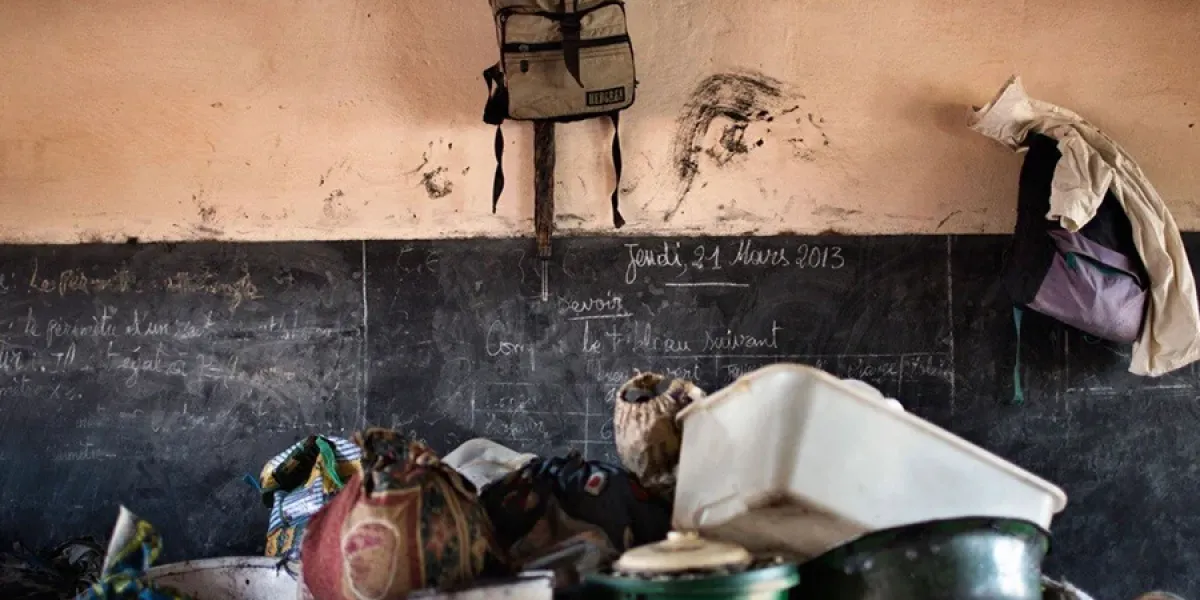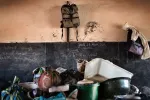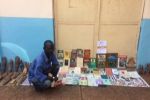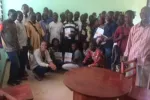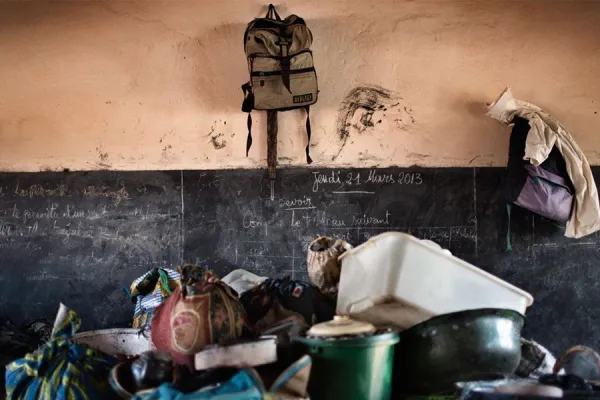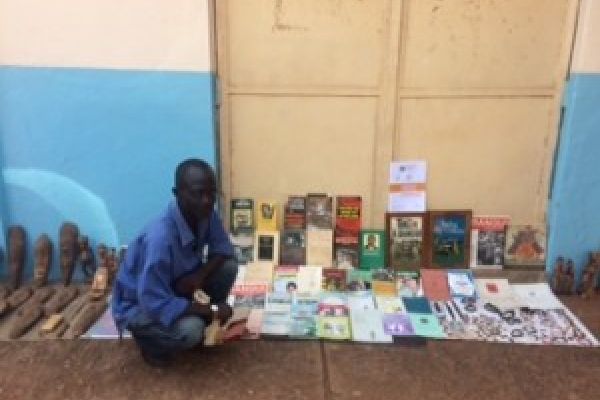A summarizing transcript of CAR president Touadera’s speech and the subsequent discussion at Brookings Institute. You can find the complete video on the right.
Intro, by Steven J Bennett: ‘the situation is not that bad’. Subject: a donor conference coming up. ‘we can be glad that the president Touadera has come to power with a great deal of legitimacy’.
Touadera (translated): I would like to talk about the developments in my country. Thanks ‘president Obama and the American people, our friends’. ‘the CAR is grateful for the personal involvement of his excellency president Barack Obama, involvement in our stabilization and in our peacemaking during the crisis’.
‘our history has always been marked by crisis’. ‘of all those crises, the one in 2012 and the one in 2013 were the most bloody. Religion was used for violence between Muslims and Christians and this crisis was marked by violations of human rights, the destruction and looting of public and private property and the destruction of the economic fabric and this brought about a humanitarian crisis without president. This crisis lasted 3 years and really it made the state of CAR fail. This caused disunity in the country and broke the fabric of the country.’ ‘the destruction of the state’. Thanks int. community help ‘to rebuild national cohesion’. Government, people etc have demonstrated willingness to close this dark period by ‘holding presidential elections that were free, democratic and peaceful across the country’. ‘this is one of the best exits from conflict’. ‘I committed myself, once in office, to build a country of peace, of security, a country that’s concerned with the search of cohesion and justice…where corruption would be the main enemy of the government…in summary, I have committed myself to building rule of law in my country’.
- Minister, Nat assembly is working now, started restructuring armed forces – ‘so that we can have a democratic and inclusive military’. I also committed myself to sustainable peace and started a dialogue with the armed groups, started a DDR and security sector reform.
National reconciliation: have set up commission of truth and reconciliation. ‘The government has set up a court system that has become functional all over the country so that justice can be rendered effectively and close to the citizens. And government authority is functional all over the country with help of the international community’.
Economy: cleaning up funds, clearing up customs, auditing systems for corporations, launch development of sectors such as mining, agriculture. Improvement of business climate (one of my priorities) . launch reforms to improve investments. And a job creating private sector.
Refers to help of the US, LRA (evil, people who are causing violence) – shows that the situation is fragile. ‘we need the input of everybody for social cohesion’.
‘Coming here, we come to get strength from you…but also to convey a message, a message of hope…You [institute or US] have demonstrated that democracy can be strengthened, security can be strengthened, and that opportunities can be found here in the US…So we come here to also strengthen our economical, social and political cooperation with the US. We want the lifting of embargo on weapons. Embargo imposed on the CAR and we want to train our military so that they can start their mission [..] on the integrity of the territory and the people and of property. We also brought a message of hope and friendship, because the CAR has some assets for sustainable development. Indeed, we have a geology, a hydrography climate, agricultural potential, forestry potential … we are in the heart of Africa … this country is tremendously rich in natural resources, but that are not well developed, or not well enough. We have tremendous mining resources according to the world bank …we have 470 mining sites and a partial lifting of the Kimberley process would open that industry. We have iron, copper, gold, diamond, …4 petroleum sites…between 1 and 5 billion barrels that have not been exploited yet…[sums up agricultural potential, cettle, tourism, hunting, energy production, etc]…in addition to this post-conflict situation…’
‘We’ve had different forms of aid and this has brought back peace and constitutional legitimacy’ ‘but…the situation needs some support, support on the part of the international community. That’s why the CAR is closing this dark chapter of crisis. We have come back to constitutional order, we have a national assembly that is fulfilling its role, we have a government made up of technocrats, representing the various political forces of the country, civil society and all the regions of the country. CAR is on the right track…’
- Conference of donors nov 17 2016 in Brussels
[end of speech]
[Discussion]
Q: We are all Central Africans…I’d like you to try to bring us into the mindset of a citizen of CAR who lives not in Bangui, on the border perhaps of South-Sudan or Birao, the border with Chad, perhaps describe what this person has experienced. How did this person experience the crisis that you mentioned? And with the efforts of the community, the church…how did such a person overcome this situation and survive? And how were certain services continued to be provided? Mr president, from Bangui, how are you going to strengthen dialogue with citzens in the CAR who are so far from the capital? how do you support their efforts and their endavours?
A: ‘one of our main priorities…we really want to focus on national reconciliation…that al CAR can regain social unity…one of the measures we have taken is to go out and meet these communities…we’ve been to Boar and had discussions with these citizens…Kaga Bandoro…people live in very difficult conditions, there are still armed groups in these areas…Bria…we met all of the leaders of the armed groups that have set up in that sector…in some ways it is a taking the pulse of the population, to understand what their needs are…Sibut…we are going to continue this, to stay in contact with the communities…Obo…the LRA has been threatening the population in that area [thanks US]…
Q: In Brussels on nov 17, there will be an international donor’s conference. In Brussels, how are you going to achieve this balance between aspirations of the CAR people and the ideas/initiatives of the donor countries?
A: ‘Brussels will be a key moment in our countries’ program. As you know we are exciting a crisis…this destroyed the fabric of our country…’ the CAR people are committed to leaving this situation of insecurity, despite its challenges, they voted. ‘The population wants to live side by side’. We will present priority projects. We are going to invite our partners to support us.
Q: regional integration. You have 6 neighboring countries. How are you going to strengthen regional integration? EMCCA?
A: aspiration of the CAR is to live side by side with our neighbors ‘and we have good relations with all our neighbors’. We are part of a community. [talks about refugees that have been welcomed by neighboring countries] ‘this certainly testifies to the harmonious existence we have with our neighboring countries’. MINUSCA: provide security and civil protection in the CAR.
Q: Were you able to resists the temption of visiting maths department?
A: I would have liked…I do continue to give a few classes…
Q: ‘Mr. president was one of my professors and it’s thanks to him that I learned differential equations. He’s a very demanding, but very fair teacher. Mr. president, I’d like to address national reconciliation. In a family, when brothers argue, when they fight, this means that there is an unequal distribution of resources or it can be caused by the fact that the share of the pie is so small that everybody’s fighting for the same share of the pie. So in the context of the CAR, …I realized that there are not really inequalities in terms of the regions, there are no poor and wealthy regions…there are no extremely wealthy Central Africans, there are no extremely poor…therefore this issue of reconciliation..it is not by organizing discussions that we are going to resolve the issue, but I think rather by making the share of the pie much larger…’ Q: regarding national reconciliation, a process ‘in your opinion, how important is justice and the lack of, impunity, in this process?’
Mod: 2 other questions
Q: I work with American NGO…[wants 5min with president to discuss project]
Q: Will you be welcoming American Peace Corps volunteers in your country?
A: respond to last one: [praises peace corps] my wish is to welcome the peace corps to the CAR…As an educator, I have worked with the peace corps, I have been in the field…I continue to pressure the US ambassador so that we can implement a peace corps mission in the CAR…for the time being we do not have yet..perhaps we are not legible…
First question, regarding the role of justice: peace is the main priority. First and foremost about the DDR. ‘much of our territory is currently occupied by armed groups. Some of them have decided to lay down their arms …secondly, thanks to this crisis, we no longer have a defense force, a national armed forces. We need to rebuild the armed forces, which is a very important aspect of any nation state…the crisis, in an artificial manner, had communities turn against each others…some thought it was a religious crisis, which it was not…’ ‘It is my believe that in order to achieve reconciliation, we need to recognize the rights of the victims. We need to acknowledge that they have lost much. And in order to do this, we can only turn to justice. Justice will be the cement that holds this reconciliation together…[at forum 2015] everybody said that they wanted to have zero impunity, and that is what we are currently working on. We are working with the government in order to strengthen our legal system, so we can have an independent judicial system with trustworthy people who can truly implement law. This justice is not just something for the people. We are asking partners to assist us…This is extremely important, this notion of justice. We wish to build a state of law, that is based on the rule of law. And the population has clearly stated that…I am endavouring to build a state based on the rule of law. A state in which democracy, freedom are applicable to all.
Q: I work with African diaspora, I come from Burundi. 2 Qs: 1. What is the role of the African diaspora in your projects?; 2. In terms of constitution of your country, I’ve heard there is something about your terms. You don’t want to be glued to the presidential seat forever.
Q: with committee for free and … ‘I would like to salute you for demonstrating that the rule of law, good governance and stability can take place in Africa. As you know, the president of equatorial Guinea is Africa’s longest sitting dictator’. What would you do to urge African dictators to leave because they’ve overstayed their welcome? What would you recommend that we do to bring democracy?
Q: from DRC – you inherited a challenging situation. Why did you not think about an emergency 3 year plan to stimulate the economy…don’t you think you are going to suffer from a lack of coordination?
A: last question: the Brussels conference is predicated on a 3 year strategy. The diaspora can be a source of funding for development. In my gvmt there’s a ministry that handles this particular sector – foreign ministry.
Other question: ‘we have a constitution. You know that the constitution went into effect the day I was sworn in. My mission is to uphold that constitution, this fundamental law of the country and this is the vision of the central African people and I think that this was clearly expressed’. ‘So be reassured on that particular question, we will uphold the constitution. You know that every nation has its vision and we do respect the will of each nation’s constitution…’
[end]
